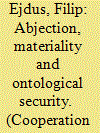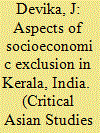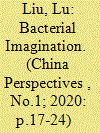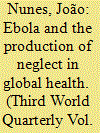| Srl | Item |
| 1 |
ID:
181532


|
|
|
|
|
| Summary/Abstract |
Ontological security scholarship in International Relations (IR) has predominantly focused on the importance of social environments for the healthy sense of self. However, material environments can also provide an important source of ontological security. In my previous work I have argued that to assume this role of ‘ontic spaces’ material environments need to be discursively linked to states’ self-identity either through projection or introjection. In this article, I draw on the work of Julia Kristeva to argue that ontic spaces can also come about through abjection or the rejection of a material environment from the narrative of the self. I illustrate this theoretical point in the case study of the Serbian Orthodox Church of Christ the Saviour in Pristina. Its construction began in 1992 during the rule of Slobodan Milošević but was never finished due to the Kosovo war in 1998/9. Over the years, as all proposed changes are considered to be a threat to a healthy sense of self of either Serbs or Albanians, the building has been turned into an abjected ontic space, an ambiguous symbol undermining the self/other and victim/oppressor boundaries and as such both repels and attracts, threatens and protects.
|
|
|
|
|
|
|
|
|
|
|
|
|
|
|
|
| 2 |
ID:
144914


|
|
|
|
|
| Summary/Abstract |
This article probes the intersection of spatial, caste, and gender axes of power in shaping contemporary inequalities in Kerala, through mixed-method research in an urban slum. Relying largely on qualitative data, it constructs a history of work in the slum for lower caste men and women against the backdrop of Kerala politics from the 1940s until the present. It examines the role of widening gender gaps, the persistence of secularized caste, and flagging working-class politics and discourse in shaping contemporary socioeconomic exclusion in urban areas.
|
|
|
|
|
|
|
|
|
|
|
|
|
|
|
|
| 3 |
ID:
172995


|
|
|
|
|
| Summary/Abstract |
This paper studies the critical role of the microscope in subject formation of early 1950s People’s Republic of China. The campaign against alleged germ warfare (xijun zhan 細菌戰) in 1952 politicised the action of seeing the enemy through the discourse of science. Widely used for science education and mass mobilisation for the campaign, the microscope was at once visual technology and an apparatus of power, magnifying hidden and invisible enemies that threatened the new regime. This paper argues that “seeing the enemy” was the hygienic practice of weisheng (衛生), which took on a new meaning of abjection in the early 1950s. By looking into news reports, visual materials, and science writing from this period, this paper proposes a transdisciplinary methodology for studying PRC history that brings together psychoanalysis, visual culture studies, and the history of science and technology.
|
|
|
|
|
|
|
|
|
|
|
|
|
|
|
|
| 4 |
ID:
144250


|
|
|
|
|
| Summary/Abstract |
This article argues that the 2014 Ebola outbreak in West Africa reinscribed the neglect that has surrounded this disease. The argument develops theoretical tools for understanding how neglect is produced in global health. Arguing that neglect is connected with the production of harm and vulnerability, it stresses the importance of emotions in issue-prioritisation in global health. Focusing on the dynamics of abjection, the article shows how the 2014 Ebola outbreak was framed as a (racialised) African problem and obfuscated by a political and media spectacle. The result was the preference for short-term crisis-management responses that detracted from long-term structural solutions.
|
|
|
|
|
|
|
|
|
|
|
|
|
|
|
|